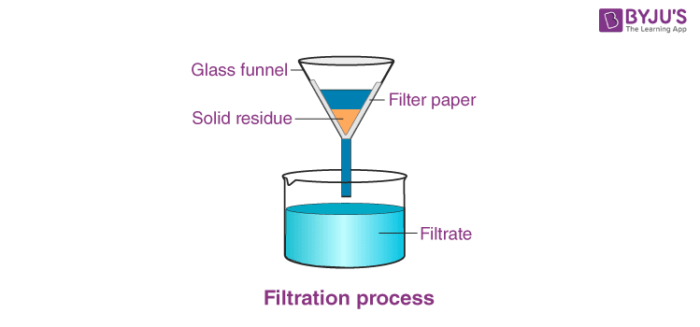Filtration definition
Filtration is technically defined as the process of separating suspended solid matter from a liquid, by causing the latter to pass through the pores of a membrane, called a filter.
Filtration Examples
The most common example is making tea. While preparing tea, a filter or a sieve is used to separate tea leaves from the water. Through the sieve pores, only water will pass. The liquid which has obtained after filtration is called the filtrate; in this case, water is the filtrate. The filter can be a paper, cloth, cotton-wool, asbestos, slag- or glass-wool, unglazed earthenware, sand, or any other porous material. Filtration is used in water treatment and sewage treatment. To have a clear understanding of the matter and its states checkout the three states of matter.

Filtration Process
The mixtures are of two main types: homogeneous mixtures and heterogeneous mixtures. A homogeneous mixture is a mixture that is uniform throughout. A heterogeneous mixture is a mixture that is not uniform throughout, i.e., ingredients of the mixture are distributed unequally. Air is a homogeneous mixture of different gases, including oxygen, nitrogen, carbon dioxide, and water vapour.
Homogeneous mixtures are sometimes also called solutions; especially when it is a mixture of a solid dissolved in a liquid. An example of a heterogeneous mixture is the mixture of sand in water. On shaking, sand will stay undissolved and are distributed unevenly. The sand particles floating around which will eventually settle to the bottom of the bottle makes it a heterogeneous mixture. Different types of filters are used to purify and for separation of mixtures from the contaminants. Based on the type of contaminant-large or small, filters of different pore sizes can be used, even at home.
Applications of Filtration
Filtration also plays a role in water treatment. The process of filtration can become a costly process when it comes to water treatment and water purification. Maintenance and lack of regulation can become major disadvantages of filtration. Also, water treatment filters are not regulated by any health commission or department, so the effectiveness of filtration and purification can vary widely between manufacturers. But filters have enough advantages to be used as a mechanism of water treatment or purification.
Read more Chemistry Articles
To know more about filtration download BYJU’S – The Learning App.

Goood
omg this is awesome
thank you this helped very much